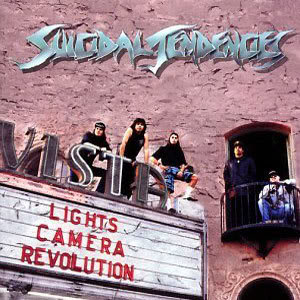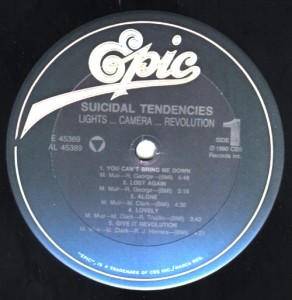 The significance of Suicidal Tendencies’ dual image hadn’t quite hit me until the day I mentioned them to my first girlfriend as one of my favorite metal bands. She immediately shot back at me, ”Suicidal Tendencies isn’t metal, they’re punk!” And as she was way more into punk than metal, she would know, right?
The significance of Suicidal Tendencies’ dual image hadn’t quite hit me until the day I mentioned them to my first girlfriend as one of my favorite metal bands. She immediately shot back at me, ”Suicidal Tendencies isn’t metal, they’re punk!” And as she was way more into punk than metal, she would know, right?
Me being a ”big picture” guy, I’ve been loathe to classify Suicidal as purely a punk band, if only because the bulk of their catalog has more or less fallen squarely into the ”metal” bucket, with shards of punk here and there. The punk element will always be there, but by 1988, Suicidal had fully entered the thrash metal realm with their Epic Records debut, How Will I Laugh Tomorrow When I Can’t Even Smile Today.
…and this is why I was so taken aback when I was challenged on Suicidal’s metal credentials. I hadn’t yet heard the original recording of the band’s self-titled 1983 debut, which is acknowledged as a hardcore punk classic. The album’s best known song, ”Institutionalized,” even made history as one of the first hardcore videos to be aired on MTV. However, my exposure to Suicidal’s punk roots up to that point was actually the re-recorded version of the first album, released by Epic in 1993 as Still Cyco After All These Years. It played more like Slayer than Minor Threat — professional thrash metal with the speed, spirit and ferocity of hardcore punk. It’s really a completely different record from the 1983 debut, even though Mike Muir and company don’t veer far from the original arrangements.
 But first impressions tend to be the strongest ones, and for me, the first album I heard by Suicidal was — and still is — the best. There’s no doubt that 1990’s Lights…Camera…Revolution is anything but a metal record, and a bona fide classic at that. The band’s third release for Epic and second to earn a gold record award from the RIAA for shipments in excess of half a million copies, Lights found the band at a time in their history when their notoriety was at a peak, their fame was on its way to a peak, and their fingers were on the pulse of the culture in a way that had a tremendously positive effect on their music. Plus they now had metal guitar shredders Mike Clark and Rocky George beating us over our heads with crunchy riffs and searing solos that matched the fervor of Cyco Miko’s alternately spitfire, melodic and tender vocal delivery. What was not to love?
But first impressions tend to be the strongest ones, and for me, the first album I heard by Suicidal was — and still is — the best. There’s no doubt that 1990’s Lights…Camera…Revolution is anything but a metal record, and a bona fide classic at that. The band’s third release for Epic and second to earn a gold record award from the RIAA for shipments in excess of half a million copies, Lights found the band at a time in their history when their notoriety was at a peak, their fame was on its way to a peak, and their fingers were on the pulse of the culture in a way that had a tremendously positive effect on their music. Plus they now had metal guitar shredders Mike Clark and Rocky George beating us over our heads with crunchy riffs and searing solos that matched the fervor of Cyco Miko’s alternately spitfire, melodic and tender vocal delivery. What was not to love?
The notoriety part was actually something that had been following Suicidal since their hardcore days. With their live appearances attracting violent elements, and rumors spreading of the Venice Beach band’s association with gangs, they were banned from public appearances for a number of years in L.A. At the time of the release of Lights in July of 1990, the band was still a couple years away from being allowed to play in L.A. again, and the video for the album’s lead track, ”You Can’t Bring Me Down,” made an overt reference to this fact.
While ”You Can’t Bring Me Down” was taking shots at haters in a boldly confrontational way, it also introduced a bolder side of Muir’s humor with his spoken asides. If he was looking to win over some new converts, it very likely worked from the moment he declared, ”Who the hell are you calling crazy? You wouldn’t know what crazy was if Charles Manson was eating Froot Loops on your front porch!”
[kml_flashembed movie="http://www.youtube.com/v/nxcJW6bs5os" width="600" height="344" allowfullscreen="true" fvars="fs=1" /]
Fortunately, it didn’t stop there. ”Lovely” took a tongue-in-cheek approach in looking at the world through the eyes of the PMRC. With the infamous Tipper Gore-instigated congressional hearings from a few years prior still fresh in the minds of not just the artists targeted, but fans of music in general, Muir found an entertainingly sarcastic way to get his point across that most of the time, art is imitating life, not the other way around. ”So Tipper, babe, don’t you remember me? Now I’m kinder, gentler and so happy!” Muir gleefully reports, while the next song in the album’s sequence, ”Give it Revolution,” states his position with no bullshit to fog it up: ”Throughout all time and history / The world’s been mauled by tyranny / Now we’re refusing to take it.”
”Lovely” also gave us the first taste of the funk influence brought on board by Suicidal’s newest member at the time, future Metallica bassist Robert Trujillo. The funk+metal+parody equation worked even better on the album’s third single, ”Send Me Your Money.” Targeting the reviled televangelists Jim and Tammy Faye Bakker, it turned out to be the best example of just how much fun Suicidal could be. Within a few years, Muir would take this Suicidal meets Red Hot Chili Peppers sound and form a whole new band, Infectious Grooves, to explore it further.
While the rest of the album mined more familiar territory, it still did so with a sense of fun that was lacking on How Will I Laugh, and in the case of ”Alone,” the band basically wrote a more straightforward and inviting version of their 1988 album’s classic title track.
The release of The Art of Rebellion in 1992 would mark Suicidal’s commercial peak, and that album’s success was arguably due in part to the high expectations set by Lights. But for the most part, it was all downhill from here. The band broke up in 1995 following an embarrassing final effort for Epic, only to regroup a few years later with a new lineup and a renewed commitment to — you guessed it — their hardcore punk roots. Hmm, maybe she was right…
In true Cratedigger style, this edition of Popdose Flashback 90 was reviewed using a real vinyl record.
[kml_flashembed movie="http://www.youtube.com/v/6pSASMpoPCs" width="600" height="344" allowfullscreen="true" fvars="fs=1" /]





Comments